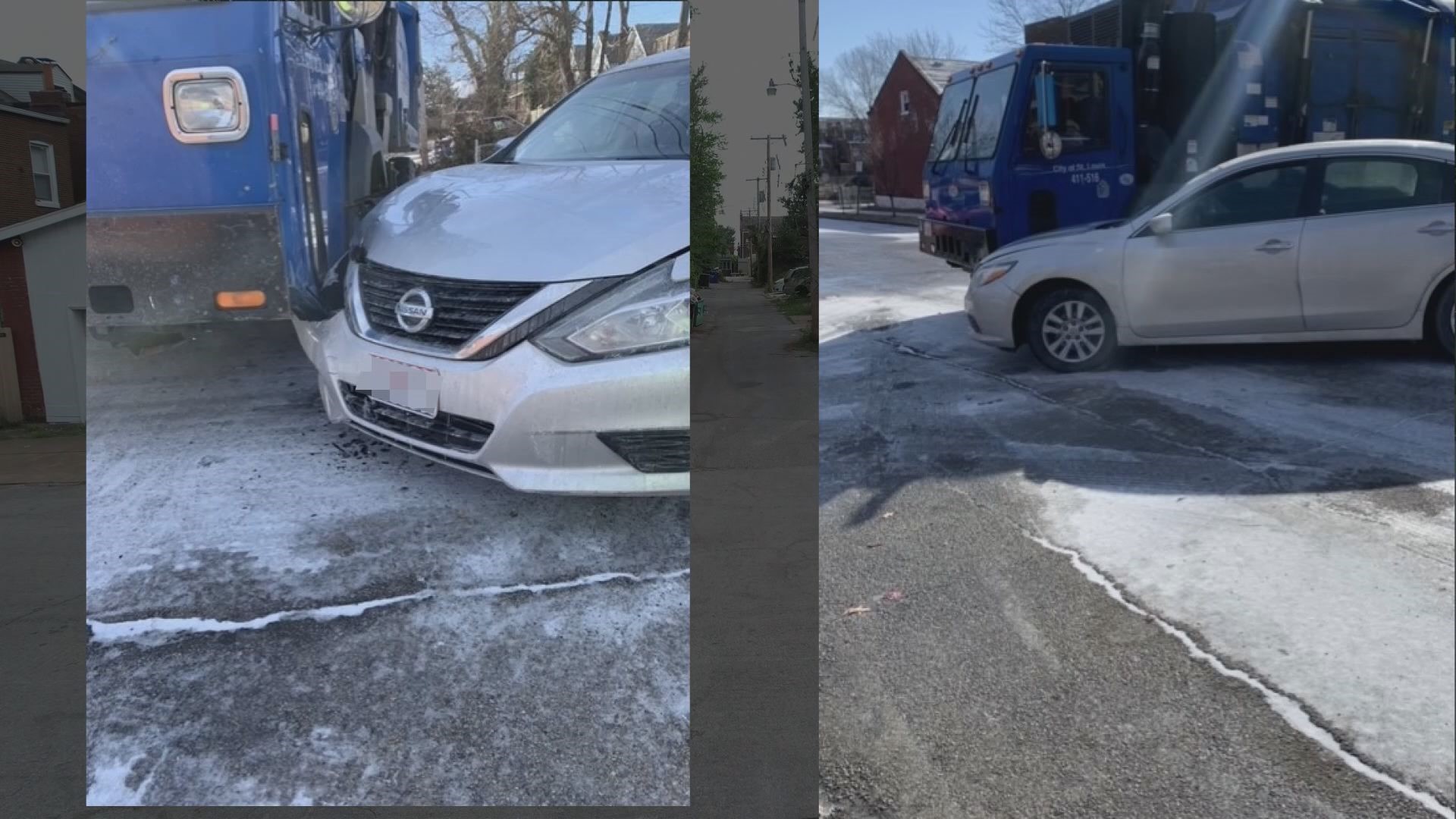ST. LOUIS — One woman called our I-Team's tip line after she said a trash truck driver crashed into her. She said the city won't pay the full damages. Our I-Team discovered she's not the only driver with that problem, and her options to get compensated may be limited.
What happened to Lindsay Du Buque’s car in an instant has led to a six-month insurance nightmare.
“It's literally made our lives a living hell," she said.
She blames the City of St. Louis. She’s been trying to get paid after she said a trash truck totaled her car. She was driving down Juniata Street. She said a city truck pulled out of an alleyway on a winter day in late January, crashing into her.
“He was at fault. It was, you know, black and white," she said.
But the city will not accept full responsibility.
“They're just refusing to pay out," said Du Buque.
The compensation offered by St. Louis’ claims division: 75 percent of the value of her 2018 Nissan Altima. Du Buque said it's not enough to buy a new one. And it doesn't touch rental costs or lost wages when she couldn't drive as a traveling pediatric nurse.
“Just in rental car fees, it was over $1,000," she said. “I had to cancel all my patients."
Turns out, Du Buque is not alone. Attorneys we’ve talked with estimate there are hundreds of city vehicles, like trash trucks, that cause crashes every day. And the city often gets away with it.
The I-Team asked to speak with anyone who settles claims for the city of St. Louis. They refused. Over the past two weeks, we also filed multiple open records requests for data on city vehicle crashes. The city has yet to respond to us.
We’ve requested a statement from the City of St. Louis about crashes involving city vehicles. St. Louis City spokesperson Nick Dunne said drivers who may be in a crash with a city vehicle should file a claim with the Citizens’ Service Bureau so that it’s on record. That way the city can launch an investigation. He also confirmed the city insures its own vehicles. Du Buque said she did file a claim and is at a standstill with the city.
“It's all too common. It really is," said Kurt Wolfgram, a St. Louis-based attorney.
Wolfgram sees it every day.
“My guess is they're saving hundreds of thousands, if not more, by just making it difficult," he said.
He said it’s because the city insures its own fleet. That means it manages its own claims, paid for by taxpayers.
“That is limiting the amount of damages that a plaintiff can recover... It means that they've lost some access to the courts," said Wolfgram.
And it often means it’s nearly impossible for victims to find an attorney to represent them. Attorneys know there will be too many obstacles for not enough payoff.
“By insuring themselves, is the city not being held accountable?” asked Senior Investigative Reporter Paula Vasan.
“I think they get away with not having to pay all claims at full value because they can tie you up in bureaucracy," he said.
“Do you think that's intentional?” asked Vasan.
“I think it's intentional," he said.
On the plus side, taxpayers pay less because claims are so limited. But the downside is people like Du Buque often don’t get fully compensated. The I-Team found similar protections for local governments in almost every state across the country, all leaving people footing some, if not all of the bill in wrecks they did not cause. A few months ago, for example, a Virginia city trash truck hit a woman’s parked car. The city wouldn’t pay for repairs.
Tim Anderson, an attorney in Virginia, said that in Virginia, you can’t sue the government for negligence if a crash happens while a city worker is on the job. He said city governments are immune from liability. It means taxpayers pay less in taxes. He represents clients in Virginia who have had crashes with city vehicles.
“What do you think needs to change to make sure people are better protected?” Vasan asked Wolfgram, the St. Louis-based attorney.
“Letting your elected officials know that you're being treated poorly by your own government is one step that everybody can take," said Wolfgram. “Small claims court is a place for people and you can advocate your own case in small claims.”
That might be her next move.
“I've had to take off work numerous days to go downtown and try and talk to all these people because we can't get a hold of anybody,” said Du Buque.
It’s a split-second crash that’s caused a ripple of consequences.
“Trying to get a car to pick my kids up and not being there to get home," she said.
They're consequences Du Buque said she should not have to suffer when it wasn’t her fault.
“So it's been a lot, to say the least," she said.
A spokesperson with the Insurance Information Institute, a research group, tells us the city’s insurance isn’t as accountable as private insurers. It does not have to follow typical reporting standards with claims because regulators have no oversight.
We contacted Farmers Insurance, Du Buque's insurance company. Spokesperson Luis Sahagun told us in an email: “We are continuing to work with our customer to get their claim resolved.”
Mark Friedlander of the Insurance Information Institute told us in an email that self-insured municipalities make it very difficult for consumers to collect on a vehicle crash claim because they are typically not subject to state insurance laws. “Regulators have no oversight with the city as they would with a private insurer,” he said.
You can contact the Citizens’ Service Bureau at 314-622-4800, online via Citizens Service Bureau on the city's website or on Twitter @stlcsb.

